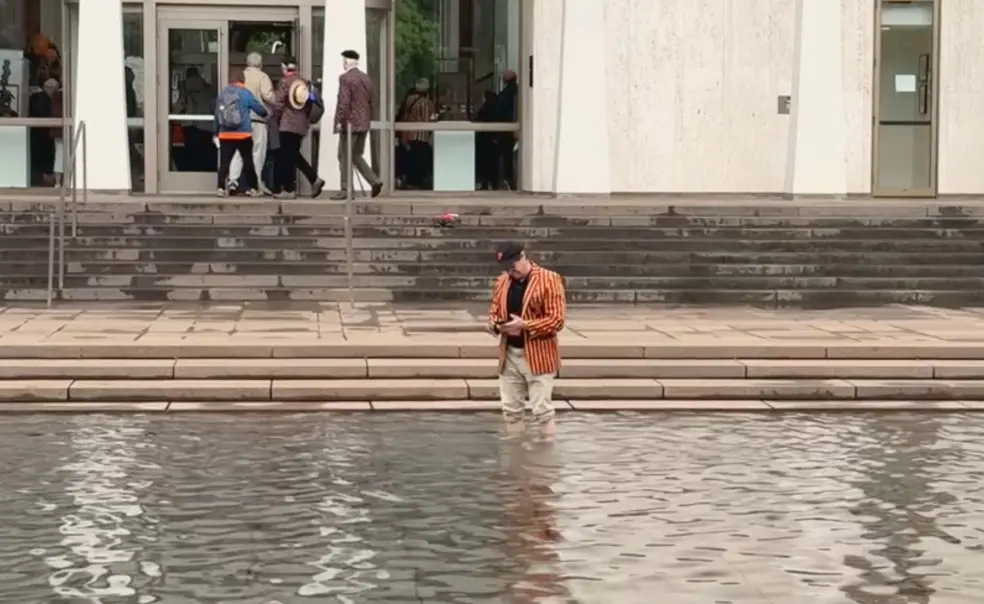Mark F. Bernstein ’83 Went to 19 Reunions Panels in One Day
Sensible people set priorities. I decided to try a different approach.
If getting an education at Princeton is like drinking from a fire hose, the many Reunions panels offered each year conjure up a different image. The educational opportunities available may seem just as overwhelming, but they can be approached a little more leisurely. Maybe more like taking a sip from a cup of cold beer.
Nearly everyone who has attended Reunions, though, has faced the problem of wanting to attend multiple interesting Alumni-Faculty Forums and panels that meet at the same time. Sensible people set priorities. I decided to try a different approach. By my count, there were 19 of these forums meeting throughout the day on Friday, each one full of highly credentialed experts covering nearly every topic imaginable. I set out to attend all of them. Why? For one thing, to see how much I could learn. I also wanted to see if it was possible.
So, with PAW publishing director Allison Sullivan riding shotgun and taking video, we saddled our trusty golf cart and set out Friday morning on my quest.
Video by Allison Sullivan, editing by Matt Cole, music by Michael Marsidi
My first stop was McCosh 50 and an 8:45 a.m. panel titled, “High Stakes: The Legal, Medical, and Social Implications of Drugs in America.” It is an issue of national importance, and interesting insights from the panel of highly credential experts began almost immediately. Liz Bogel Ryan ’00, with a long background treating opioid addiction, observed that “old school addictive care is punitive .... . . and it can be done better.” Her classmate and fellow panelist Nabarun Dasgupta ’00, a professor at the University of North Carolina, noted that 42% of Americans know someone who has died of a drug overdose.
It was a fascinating discussion, and I wanted to learn more. But I had ground to cover, so I jaunted over to McCosh 10 and my second panel, “Oh the Places We Go! Travel Stories from Princeton Alumni.” Princeton alums, I learned, go everywhere. Rebecca Graves-Bayazitoglu *02, an associate dean in the Office of International Programs, discussed her journey to Antarctica, while Carl Walter ’70 added, “If we don’t have travel, misperceptions about our country will grow even greater than they are now.”
Sage advice, but speaking of travel, it was time to hop back into my golf cart and move on to the next panel and my first problem. Members of the Class of 1980 were discussing public service in what the Reunions app said was “Madison Hall, Mathey Common Room.” Those are two different locations. There is a Madison Hall, but it’s in Rockefeller College. My panel was nearby, in Mathey, but by the time I had straightened this out, I had missed most of the discussion. However, I am reliably informed that it too was filled with highly credentialed experts offering interesting insights about issues of national importance.
As the morning progressed, my losing streak continued. A conversation with retired Gen. Mark Milley ’80 in one of the bowls at Robertson Hall was filled well beyond capacity by the time I arrived. There were five more panels in the 10:30 a.m. block, including ones on journalism, urban design, cognitive health, space travel, and fiscal policy, again, all staffed by highly credentialed experts offering interesting insights about issues of national importance. More significantly from my standpoint, the venues now ranged between McCosh, Robertson, the Frist Campus Center, and the Lewis Thomas Laboratory farther down campus. I was able to dip in to all of them briefly, but by the time I ventured over to McDonnell Hall for an 11 a.m. discussion between Professor Robert George and Cornel West *80, it too was packed, and I had no chance of getting in.
Unexpected challenges also began to arise. One was traffic. The paths around campus were filling up, which required some nimble driving, and the panels were growing more crowded, even the ones I could get in to. Another challenge was registered by my quads. The golf cart was terrific, but all the lecture halls were either upstairs or downstairs. I lost count of how many times I climbed up to McCosh 10 and McCosh 50 and back down again.
Over a slice of pizza at Frist, I planned my assault on the 2 p.m. panels, the busiest block of the day, again all filled with highly credentialed experts discussing — well, you get the point. Fortunately, I was able to get into what was probably the most highly attended event of the weekend, a conversation in McCosh 50 between retired Gen. David Petreaus *85 *87 and former SPIA dean Anne-Marie Slaughter ’80. Petraeus had only begun to share his assessment of the strategic challenges facing the United States before I had to move on. There were five more discussions occurring simultaneously, covering reproductive health, storytelling, career transformation, sovereign debt, and the Indian economy, spread across campus. As I rambled around, I discovered something I hadn’t expected: free food, including plates of cookies and sandwiches left over from numerous lunchtime events. Knowledge comes in all forms.
Nearly six hours after I began, I wrapped up with the final three panels of the day in the 3:45 p.m. block, covering affirmative action, comedy, and the pernicious effects of technology on mental health. Notice that I am reporting them in much less detail than the morning panels because they were now blending together in my brain. The mental health panel wasn’t very funny, and the comedy panel made me want to put my phone away — although perhaps I have gotten them mixed up. With more than enough food for thought, as well as some free food, I drove to the PAW class secretaries party at 4 o’clock, my experiment over.
The good news is that I made it to every panel on Friday, even if I couldn’t actually get in to a few of them. The bad news, I must admit, is that I was moving too fast to retain much from any of them. However, I did take away a few valuable lessons. The most important is that attending every Reunions panel can’t be done. There are far too many, and the ones with big-name panelists will fill up quickly. It probably shouldn’t even be attempted, either. Much better to pick an interesting topic — you really can’t go wrong — sit back, and learn something.
But whatever you do, get a golf cart. For getting around campus, it’s a game changer. Seriously, those old guys in the P-rade know what they’re doing.
Mark F. Bernstein ’83 is PAW’s senior writer.













No responses yet